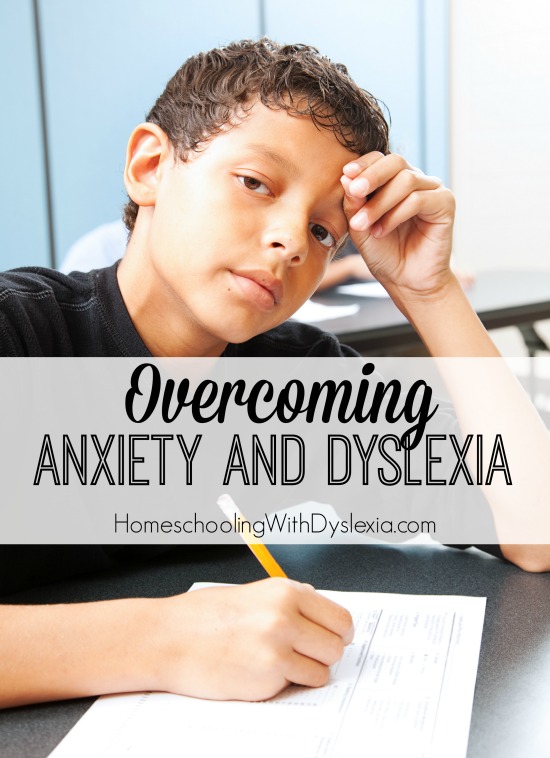Stress is a normal part of life for all people. However, people with dyslexia can experience high levels of stress and anxiety in ways you may not realize. Here are some tips for understanding and helping kids with dyslexia and anxiety.
If you prefer to listen to this post, click on the player below:
Stress and Anxiety
Stress can be caused by a physical threat, such as experiencing a car accident, or a psychological threat, such as fear of forgetting your lines while speaking in front of others. The way that we respond to stress is a reflex that is often referred to as fight or flight and is a natural response to a perceived danger that is meant to protect us from harm.
We can run away from a stressor (flight) or stand and take on the stressor (fight). If we feel like we can overcome some stressor, we will ‘fight’ and in doing so return to our normal relaxed state of being.
However, if a stressor causes us to feel a lack of control, or as if we cannot overcome it, this leads to a negative flight response. In extreme cases, this fear can cause a person to freeze – either mentally as in to shut down thinking or physically as in an inability to physically move. In this situation, we are literally paralyzed with fear of harm – whether physical or psychological.
Anxiety and Dyslexia
Stress and anxiety increase when a situation feels out of our control. All people can experience extreme stress and feel anxious, however, people with dyslexia are more apt to experience anxiety than others. Many dyslexics do not fully understand what dyslexia is and how it affects their learning. This can be made worse by teachers, coaches, and even friends and family who don’t understand dyslexia and, oftentimes, believe the variety of the hurtful myths surrounding dyslexia. These misunderstandings lead to years of self-doubt and can, over time, result in a lack of confidence and an inability to face their many daily challenges at school, work, and home.
Because the early years of school focus primarily on the very subjects that cause dyslexics the most trouble – reading, writing, and spelling, their progress is oftentimes slow and frustrating – especially when taught with traditional teaching methods.
This situation is made worse by being compared to siblings or classmates that learn well with traditional methods. This continual sense of coming up short can lead to embarrassment and defensiveness.
Because people with dyslexia have experienced embarrassment when their weaknesses are misunderstood, they are more likely to withdraw from social situations with the risk of becoming depressed and isolated. Read this post for more information on the emotional side of dyslexia.

Overcoming Anxiety in Dyslexia
As parents of dyslexics or dyslexia advocates, it is our job to empower our kids to overcome these situations. Here are six tips for overcoming anxiety associated with dyslexia:
1. Testing: If your family is experiencing high levels of stress because of your child’s learning struggles, I recommend that you get him or her tested. Testing will show specific areas of weakness and strength and often reveal that your child’s struggles are not due to a lack of intelligence as many misunderstand dyslexia to be. Read this post on how and where to get tested for dyslexia.
2. Educate: Based on the information obtained by the testing you have done, parents and kids need to be taught how dyslexia has an impact on his or her performance in school, the workplace, or social situations including a thorough debunking of the myths associated with dyslexia. There are tons of reliable dyslexia resources listed right here on our site as well as our Parent Dyslexia Classes designed to educate parents quickly.
3. Anticipate: Encourage a dialogue with your child about situations that are causing the most stress for them and role play and discuss ways to face them – the fight reflex. For example, if attending a classroom situation is causing anxiety, mom or dad can talk to the teacher and explain what dyslexia is and common accommodations that are helpful such as not requiring a child to read out loud or pairing the dyslexic child with a child who reads well when there are activities requiring reading or writing beyond their ability.
4. Teach Advocacy: It’s important to teach children, adolescents, and adults effective strategies, techniques, and approaches that will maximize success and minimize frustration and failure. This often involves teaching them how to self-advocate – a skill they will need for the rest of their lives. Advocacy involves understanding their diagnosis, what areas of their learning are the most impacted, and which accommodations benefit them the most. In the adult years, this may also involve understanding legal rights. Read more about how to teach kids with dyslexia the vital skill of self-advocacy here.
5. Exercise: Regular and vigorous physical activity is known to enhance brainpower and reduce stress. So it is important to build in opportunities for exercise. This step also involves encouraging the person to drink plenty of water and eat a healthy diet.
6. Success: In my experience raising and homeschooling our 7 kids with dyslexia, one of the most important things to do is to find areas of strength and cultivate them. This results in experiencing success often not easily found in the classroom. Allow your kids with dyslexia to experience sports, the arts, maker classes, or any other activity that they may have an affinity for. Many adult dyslexics will tell you that they never would have made it through their school years without being able to thrive in some area whether sports or music or art.
Start Here
If you are looking to get educated about dyslexia and how to educate, encourage and empower your kids with dyslexia, you have come to the right place.
For more information on getting started homeschooling your child with dyslexia, download my free ebook, Homeschooling With Dyslexia 101, What You Need to Know to Homeschool Your Kids With Dyslexia, that covers things like understanding learning styles and teaching methods, how to create a positive learning environment and schedule, or how to set goals and get it all done.
For more information on specific strategies to teach your dyslexic child the way he or she learns, consider taking one of our Parent Dyslexia Classes.

Do you have a child with dyslexia who also struggles with anxiety? How have you helped them to overcome?






Hi Marianne,
Thank you for addressing such an important aspect that may often be present when a child struggles to read and learn. My own son became literally very depressed as we were searching for clarity and solutions regarding his struggles with learning. Thankfully we came across the Davis Dyslexia Correction Program (www.dyslexia.com) which has such a positive approach. Instead of hammering on his weaknesses, it has built on his strengths and unique abilities due to his dyslexia processing style. Because of this, the Davis approach has also really turned around his emotional outlook on life. We are so grateful!
I also wanted to make a comment on the importance of how we, as parents and teachers, view and speak of our children’s struggle with learning. My words and perspectives can either give hope, or create despair. The more I have learned from the Davis approach, the more I have become convinced that my son does not have a “learning disability” at all. He is totally capable of learning, when taught according to his learning style. He does not have a learning disability; rather it is I (and the whole system really) who have a “teaching disability.” There is nothing broken about my son; there is nothing that he needs to change. Rather it is I (and the system) who need to change.
Consider this quote from Albert Einstein: “Everyone is a genius, but if you judge a fish by its ability to climb a tree, it will live its whole life believing that it is stupid.” I found this in a book that has impacted me profoundly: Fish Don’t Climb Trees — A Whole New Look at Dyslexia by Sue Blyth Hall. So let us all be careful to inspire the gift without creating the illusion of disability.
Karin
Marianne — what a fantastic article about a really important topic. I love your tips about demystifying the child’s learning challenge and promoting exercise. I’m always concerned when I hear about a student who is held in from recess or lunch so they can finish their word. Movement is essential!
As an educational therapist, I work with a number of children with dyslexia who also have anxiety challenges. I’ve found that some students benefit tremendously from short-term work with a cognitive behavioral therapist who can teach them powerful strategies for managing anxiety. For kids with more garden-variety worries, I find it helpful to coach students to notice when they’re making predictions. The Coping Cat Workbooks also have many fine tools.
Thanks for commenting Anne-Marie. I really appreciate the work you do at Bay Tree Blog. I’ll look into the Coping Cat Workbooks.
Thank you for writing the article. It was a great read. And added a bit of confidence. I also love the rely’s. So thanks you.
Thank you for this important article. Do you have any recommendations for finding a counselor for my child who is knowledgeable in how dyslexia affects her emotions and mental health? The first one we visited acted like dyslexia is just a minor detail in my child’s life.
I don’t. Maybe an experienced dyslexia tutor would be helpful to talk to her.
Thank you so much for this reassuring & helpful info. I’m going to carry on my research. I’ve literally just come home today with a child who is in tears (me too) because they got in trouble for not completing 60 times tables questions in 3 minutes. It’s the Stress & Rush that makes him freeze up (I know from homeschooling during the lockdown that his TT knowledge is fantastic). Also spelling tests, argh, so pointlessly upsetting and frustrating!